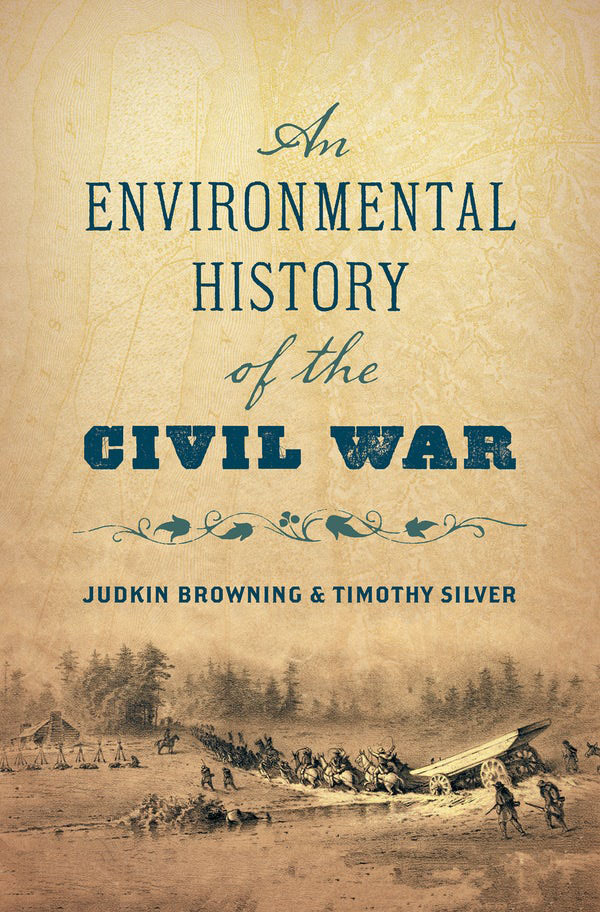
Appalachian State University professors Dr. Judkin Browning, left, and Dr. Timothy Silver both teach in the Department of History. Browning and Silver are co-authors of the book “An Environmental History of the Civil War,” published by the University of North Carolina Press in February. Photo by Chase Reynolds
BOONE, N.C. — Appalachian State University’s Dr. Judkin Browning and Dr. Timothy Silver, both professors in the Department of History, have co-authored a book that reevaluates the Civil War from a perspective focused on the environment.
Browning and Silver’s account of the Civil War, titled “An Environmental History of the Civil War,” goes beyond a discussion of the terrain and weather patterns common to areas of battle and examines the large-scale modifications of the landscape across several states during the war, as well as how the conflict sparked new thinking about Americans’ relationship to the natural world.
One of the most critical points of examination in their book is the way disease was cultivated and spread between humans and animals during the war. Browning notes that one of the greatest obstacles for Civil War Maj. Gen. George McClellan was the “recurrence of malaria.”
Browning and Silver also show how the war influenced the future of weather forecasting and veterinary medicine, as well as the birth of the conservation movement and the establishment of the first national parks.
James M. McPherson, the Pulitzer Prize-winning author of “Battle Cry of Freedom,” called “An Environmental History of the Civil War” a “splendid account of the impact of the environment on the ways in which the war was fought.”
Hardback and e-book formats of “An Environmental History of the Civil War” are available for purchase from the book’s publisher, University of North Carolina Press, and the University Bookstore. The book is also available in both e-book and hardback formats through App State’s Belk Library and Information Commons.
By Judkin Browning and Timothy Silver
2020
About the authors
Dr. Judkin Browning, who serves as the director of App Sate’s Master of Arts in history degree program, has written three books, including “An Environmental History of the Civil War,” and is the editor of “Letters From A North Carolina Unionist: John A. Hedrick to Benjamin S. Hedrick 1862-1865.” He is currently working on projects that explore North Carolina deserters during the Civil War, as well as the long-term effects of battles on soldiers and their families and communities.
Browning received his Bachelor of Arts in history from Florida State University in 1996 and earned his M.A. in public history from North Carolina State University in 1999. He holds a Ph.D. from the University of Georgia.
Dr. Timothy Silver, who holds a Ph.D. from the College of William and Mary, is the author of “Mount Mitchell and the Black Mountains: An Environmental History of the Highest Peaks in Eastern America.” The book has won several awards, including the 2003 Ragan Old North State Award for Nonfiction, given by the North Carolina Literary and Historical Association, and the 2004 Phillip D. Reed Memorial Award for Outstanding Writing on the Southern Environment, conferred by the Southern Environmental Law Center.
His other publications include “A New Face on the Countryside: Indians, Colonists and Slaves in South Atlantic Forests, 1500-1800,” “A Useful Arcadia,” “Big Tom Wilson” and “New Faces in an Old World.” Silver currently teaches courses focused on the environmental histories of areas, including the South and Southern Appalachia, as well as national and state parks.
Listen to App State history professors Dr. Judkin Browning and Dr. Timothy Silver discuss their co-authored book “An Environmental History of the Civil War” on this College of Arts and Sciences podcast. The book, published by the University of North Carolina Press, examines how the Civil War sparked new thinking about Americans’ relationship to the natural world.
What do you think?
Share your feedback on this story.
About the Department of History
The Department of History offers a broad curriculum in local, national, regional and world history at both the undergraduate and graduate levels, which encourages history majors to develop a comprehensive approach to human problems. The study of history is an essential part of a liberal arts education and offers valuable preparation for many careers, such as law, journalism, public history, public service and business, as well as in teaching and the advanced discipline of history. Learn more at https://history.appstate.edu.
About the College of Arts and Sciences
The College of Arts and Sciences (CAS) at Appalachian State University is home to 17 academic departments, two centers and one residential college. These units span the humanities and the social, mathematical and natural sciences. CAS aims to develop a distinctive identity built upon our university's strengths, traditions and locations. The college’s values lie not only in service to the university and local community, but through inspiring, training, educating and sustaining the development of its students as global citizens. More than 6,800 student majors are enrolled in the college. As the college is also largely responsible for implementing App State’s general education curriculum, it is heavily involved in the education of all students at the university, including those pursuing majors in other colleges. Learn more at https://cas.appstate.edu.
About Appalachian State University
As a premier public institution, Appalachian State University prepares students to lead purposeful lives. App State is one of 17 campuses in the University of North Carolina System, with a national reputation for innovative teaching and opening access to a high-quality, cost-effective education. The university enrolls more than 21,000 students, has a low student-to-faculty ratio and offers more than 150 undergraduate and 80 graduate majors at its Boone and Hickory campuses and through App State Online. Learn more at https://www.appstate.edu.


![How NCInnovation Is Rethinking Economic Development in North Carolina [faculty featured]](/_images/_posts/2026/02/rethinking-economic-development-600x400.jpg)









